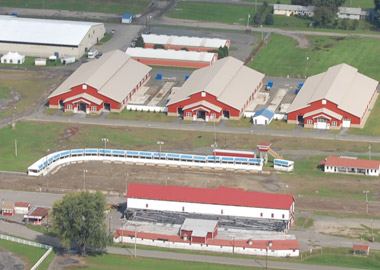On October 20, 2011, Northampton’s acting mayor David Narkewicz delivered former city councilor Maria Tymoczko an envelope with printouts of several email correspondences between the city’s economic development director and members of the Three County Fairgrounds Redevelopment Corporation.
“I am hopeful that this represents all of the emails and correspondence sent and received by Teri Anderson with regard to the fairgrounds project during the time period specified in your Public Records request,” Narkewicz wrote in his cover letter.
As previously reported (“Looking for a Fair Fight,” October 13, 2011), for nearly two years former city councilor Maria Tymoczko has been pursuing a lawsuit against the city to see this correspondence.
While the fairgrounds are privately owned, the Redevelopment Corporation’s board has included city officials, meaning that the documentation of their business dealings should be made available to interested parties under the Public Records law.
The city had released some of this material, but Tymoczko and her lawyer, Michael Pill, said that the city had appeared to be selective in what it shared. Documents Tymoczko and Pill had received from other confidential sources were not amongst those the city chose to release.
In his cover letter, Narkewicz attributed the problem delivering the complete email record to technical difficulties.
Because “city employees have limited email inbox space on their personal computer terminals,” he wrote, they regularly “file or remove older emails from their inboxes to free up space with the knowledge that all emails are archived as public records on the city’s main server.”
In responding to Tymoczko’s request, the city had only searched Anderson’s computer, not the city’s archive.
“In hindsight,” he wrote, “I believe it would have been better to search the city email archive, which may have avoided this problem.”
Narkewicz promised to review electronic storage procedures “so that we can put in place clearer protocols for future public records searches.”
As reported in “Looking for a Fair Fight,” he also planned to change the status of city employees on the Redevelopment Corporation to ex-officio or advisory, removing their ability to vote. He also withdrew Anderson as the city’s representative on the corporation’s board.
Included in the documents released by the acting mayor are several emails that indicate how closely involved the economic development director has been with the redevelopment project.
One series of emails documents Anderson’s efforts to arrange a meeting between former Mayor Higgins, the fairground officials and the editorial board at the Springfield Republican to market the redevelopment. Another email offers 32 detailed comments she made when reviewing a draft business and financing plan for the redevelopment.
Repeatedly in her comments, Anderson lists concerns that are related to the interests of the private developers, rather than the interests of the public that pays her.
“Are we really only going to have 600 horse stalls?” she writes. “If correct, we should specify permanent horse stalls and note the temporary stalls as well so that it doesn’t look like we are reducing our stall capacity.”
Elsewhere, she asks, “Do we want to provide this much detail about our current contracts? I am just thinking of any portions of this document being [made] public.”
However revealing the emails might be, the acting mayor’s disclosures did not satisfy Tymoczko or her attorney.
On October 27, in a letter to city solicitor Elaine Reall, Attorney Pill wrote that the acting mayor’s envelope of emails only “prove the inaccuracy of Ms. Anderson’s representations that the August 31 document production was complete.
“Production of requested [public] records is still incomplete,” Pill wrote. “My client and I have email correspondence that was neither in the emails Ms. Anderson produced on August 31, 2011, nor among the emails the mayor provided directly to my client.”
In addition to these emails, Pill listed seven categories of documents that appeared to be missing from the record the city provided, including all meeting minutes and any attachments to emails.
For instance, while Anderson’s detailed comments to the draft business and financing plan were provided, the actual draft—which her comments suggest that she had a hand in writing—was not.



